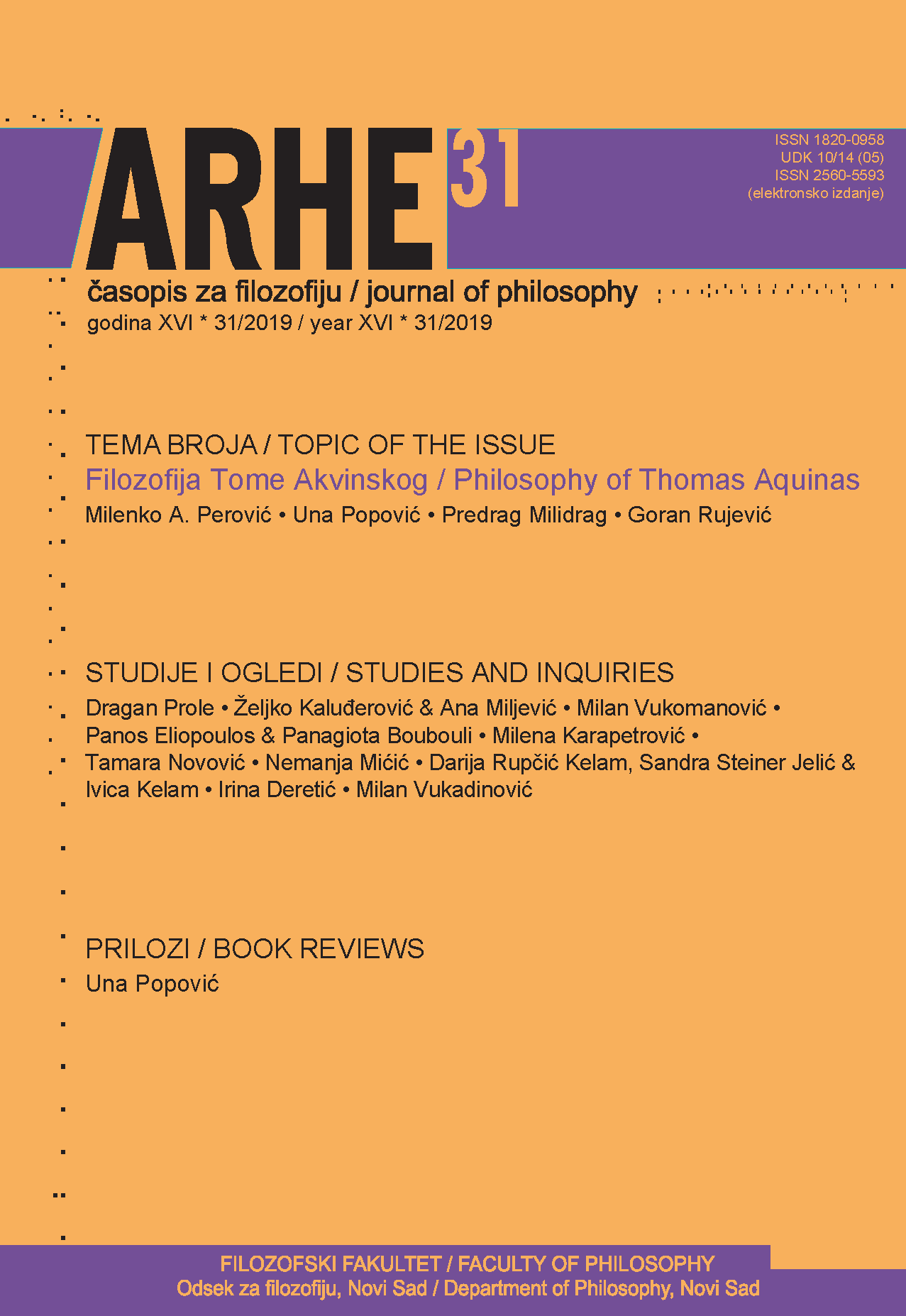THE ROLE OF CARING THINKING AND EMPATHY IN EDUCATION
Main Article Content
Abstract
Every serious educational system in contemporary times, have to consider and shape the form of learning to think and develop critical thinking. When we talk about education, then the ultimate purpose of educational activity should be the return to the subject, which means the development of an emancipated, autonomous individual, a critical thinker, and a self-conscious individual. By practicing (auto) reflection and critical thinking, we help the individual developing deep understanding and interpretation of the facts. According to Liessmann's definition of uneducation, which appears in its contemporary form as a form of halfeducation, which is the abandonment of the eagerness to understood the wholeness, we will emphasize the importance of the philosophical foundations of care and the need for the development of empathy as important phenomena in the building of the whole personality, the critical subject, and the possibility of changing the existing relationships within the society to which the educated individual tends to participate. We are asking whether we can be educated and empathized within the educational system to help understand the problem of the contemporary world and how it is to cope with the challenges the society is facing today.
Article Details
References
Adorno, Th., „Theorie der Halbbildung”, u: ders.: Gesammelte Schriften Band 8, Soziologische Schriften I, 1959., str. 93 – 121.
Arendt, H., O zlu. Predavanje o nekim pitanjima moralne filozofije, Naklada Breza, Zagreb 2006.
Arendt, H., Between Past and Future: Six Exercises in Political Thought, The Viking Press, New York 1961.
Bateson, G., Steps to an Ecology of Mind, Chandler, San Francisco 1972.
Benard, B., Fostering Resiliency in Kids: Protective factors in the family, school, and community, Northwest Regional Educational Laboratory, Portland 1991.
Bowden, P., Caring, Routledge, London 1997.
Cho, D. K., “Adorno on Education or, Can Critical Self-Reflection Prevent the Next Auschwitz?”, Historical Materialism, 17 (1/2009), str. 74–97.
Ćurko, B., Kritičko mišljenje u nastavi filozofije, logike i etike, Hrvatsko filozofsko društvo, Zagreb 2017.
Davis, M. H., Franzoi, S. L., “Stability and change in adolescent selfconsciousness and empathy”, Journal of Research in Personality, 25 (1/1991), str. 70-87.
Feshbach, N. D., “Empathy in Children: Some Theoretical and Empirical Considerations”, The Counseling Psychologist, 5 (2/1975), str. 25-30.
Engster, D., “Rethinking Care Theory: The Practice of Caring and the Obligation to Care”, Hypatia, 20 (3/2005), str. 50-74.
Engster, D., “Care Ethics and Natural Law Theory: Toward an Institutional Political Theory of Caring”, The Journal of Politics, 66 (1/2004), str. 113-135.
Feshbach, N. D., “Empathy in Children: Some Theoretical and Empirical Considerations”, The Counseling Psychologist, 5 (2/1975), str. 25-30.
Garcia, S. E., The Association Between Empathy And Prosocial Story Themes And Internalizing Symptoms In Preschool-aged Children, Doktorska disertacija, Sveučilište u Georgiji, 2013.
Hartman, J. L., Turner, M. G., Daigle, E. L., Exum, L. M., Cullen, F. T., “Exploring the gender differences in
protective factors: implications for understanding resiliency”,
International journal of offender therapy and comparative criminology, 53 (3/2009), str. 249-277.
Ingall, C. K., “Critique: The Challenge to Believe in Schools”, Religious Education, 92 (1997/4), str. 552-556.
Kindlon, D., Thompson, M., Odrastanje Kaina. Kako zaštiti emocionalni život dječaka, ArtLogos, Zagreb 2002.
Liessmann, K. P., Teorija neobrazovanosti. Zablude društva znanja, Naklada Jesenski i Turk, Zagreb 2009.
Lipman, M., Thinking in Education, Cambridge University Press, Cambridge 2003.
Maglica, T., Jerković, D., „Procjena rizičnih i zaštitnih čimbenika za internalizirane probleme u školskom okruženju“, Školski vjesnik, 63 (3/2014), str. 413-431.
Maurović, I., Otpornost adolescenata u dječjim domovima, doktorska disertacija, Pravni Fakultet, Studijski centar socijalnog rada, Zagreb 2015.
Maurović, I., „Snage djece i mladih u riziku pri ulasku u sustav intervencija: specifičnosti s obzirom na spol“, Kriminologija i socijalna integracija, 19 (2/2011), str. 11-26.
Mihić, J., Bašić, J., „Preventivne strategije – eksternalizirani poremećaji u ponašanju i rizična ponašanja djece i mladih“, Ljetopis socijalnog rada, 15 (3/2008), str. 445-471.
Monbiot, G., “Testeria”, The Guardian, 18. siječanj 2019.
Mortari, L., “For a Pedagogy of Care”, Philosophy Study, 6 (8/2016), str. 455-463.
Nietzsche, F., „O budućnosti naših obrazovnih ustanova“, u: Kant, Schelling, Nietzsche, Ideja univerziteta, Globus, Zagreb 1991.
Noddings, N., The Challenge to Care in School – An Alternative Approach to Education, Teachers College Press, New York 2005.
Noddings, N., Caring, University of California Press, Berkeley 1984.
Noddings, N., “Two Concepts of Caring”, Randall Curren (ur.), Philosophy of Education, Philosophy of Education Society, Urbana 1999.
Noddings, N., Starting at Home: Caring and Social Policy, University of California Press, Berkeley 2002.
Nussbaum, M., The Therapy of Desire, Princeton University Press, Princeton, New York 1996.
Nussbaum, M., Pjesnička pravda. Književna imaginacija i javni život, Naklada Deltakont, Zagreb 2005.
Petz, B., Psihologijski rječnik, Prosvjeta, Zagreb 1992.
Raboteg-Šari, Z., Psihologija altruizma, Alineja, Zagreb 1995.
Roberts, W., Strayer, J., “Empathy, Emotional Expressiveness, and Prosocial Behavior”, Child Development, 67 (2/1996), str. 449-470.
Platon, Eutifron, Zagreb: Matica hrvatska, Zagreb 1998.
Sharp, A. M., “The Other Dimension of Caring Thinking”, Journal of Philosophy in Schools, 1 (1/2014), str. 15-21.
Sindik, J., „Povezanost emocionalne kompetencije te mašte i empatije odgojitelja sa stavovima o darovitoj djeci“, Život i škola, 24 (2/2010), str. 65 – 90.
Strayer, J., Roberts, W., “Children's anger, emotional expressiveness, and empathy: Relations with parents' empathy, emotional expressiveness, and parenting practices”, Social Development, 13 (2/2004), str. 229-254.
Topping, A., Lyons, K., Weaver, M., “Gillette # MeToorazors ad on 'toxic masculinity' gets praise – and abuse”, The Guardian, 15. siječnja 2019.
Yahaya, A. i sur., “The Impact of Emotional Intelligence Element on Academic Achievement”, Archives Des Sciences, 65 (4/2012), str. 2-17.
Veža, K., Povezanost emocionalne empatije, prosocijalnog i agresivnog ponašanja u ranoj adolescenciji, Diplomski rad, Filozofski fakultet, Zagreb, 2006.
Web-stranice:
http://www.infed.org/thinkers/noddings.htm
